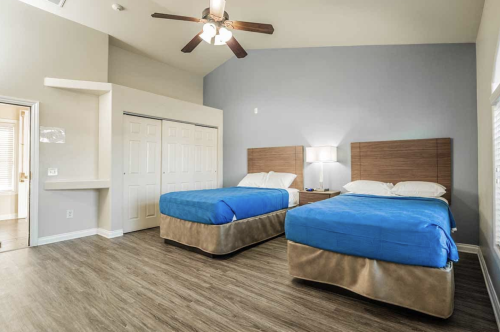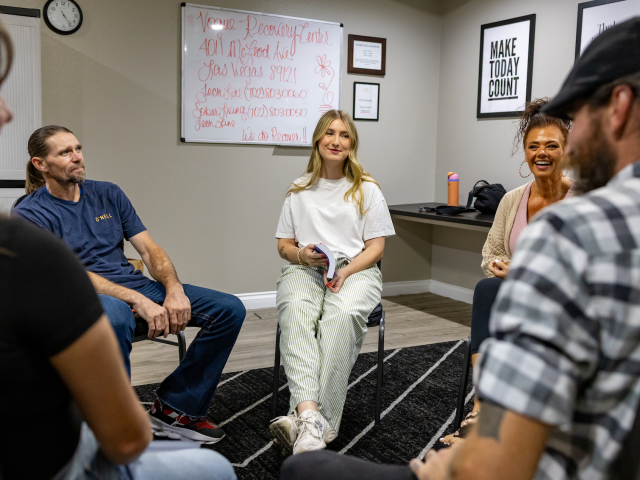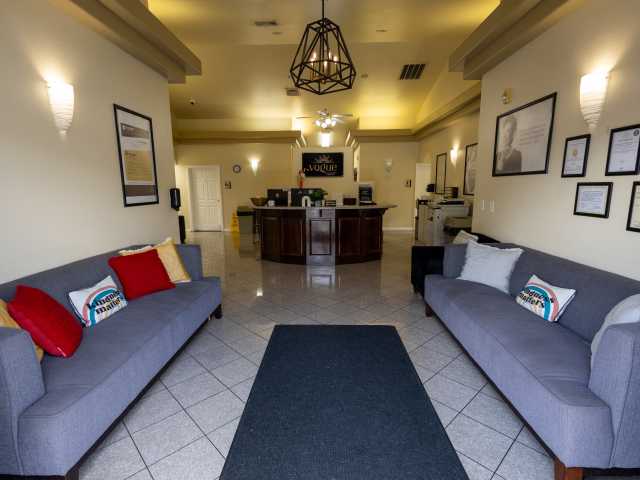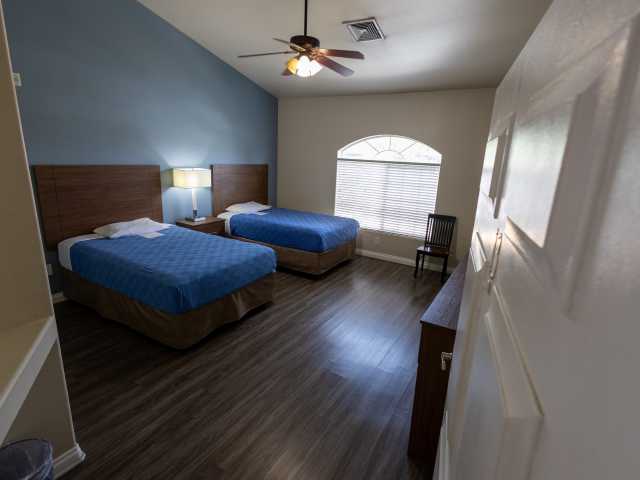








Vogue Recovery Center Nevada
Verified Center
This provider's information has been quality-checked by Recovery.com's Research Team for accuracy and completeness, including center verification through appropriate third-party organizations.
Treatment Focus
This center treats substance use disorders and mental health conditions. You'll receive individualized care catered to your unique situation and diagnosis, learn practical skills for recovery, and make new connections in a restorative environment.
Primary Level of Care
Offering intensive care with 24/7 monitoring, residential treatment is typically 30 days and can cover multiple levels of care. Length can range from 14 to 90 days typically.
Treatment Focus
This center treats substance use disorders and mental health conditions. You'll receive individualized care catered to your unique situation and diagnosis, learn practical skills for recovery, and make new connections in a restorative environment.
Primary Level of Care
Offering intensive care with 24/7 monitoring, residential treatment is typically 30 days and can cover multiple levels of care. Length can range from 14 to 90 days typically.
Provider's Policy
Vogue Recovery Center is in-network with AHCCCS, United Healthcare, Sierra BHO, Tricare, & TriWest. We also work with most other major insurance providers.
Vogue Recovery Center Nevada
Vogue Recovery Center Nevada
About Vogue Recovery Center Nevada
Vogue Recovery Center provides a complete continuum of care through residential and outpatient programs for substance use and mental health. Most clients start their journey with detox and residential treatment before transitioning through progressively lower levels of care, including Vogue’s day treatment (PHP), intensive outpatient program (IOP), and outpatient program. They also offer medication-assisted treatment (MAT), integrated care for co-occurring disorders, and specialized programming for veterans and first responders.
Experience Therapies That Heal the Whole Person
Vogue Recovery Center uses traditional approaches like individual, group, and family therapy as well as holistic treatments such as yoga, art therapy, psychodrama, and other experiential therapies. They specialize in dual diagnosis treatment that simultaneously addresses addiction and the underlying issues that perpetuate it like trauma and other mental health conditions. Each client’s care manager coordinates behavioral and physical treatment to ensure all health providers collaborate to provide the best outcome.
Recharge in a Quiet Metropolitan Area
Surrounded by pristine snow-capped mountains and glowing in the warm desert sunlight, Vogue’s Las Vegas facility offers plenty of amenities and comforts while avoiding the hustle and bustle of tourism. Welcoming and home-like, their facility offers plush furnishings, semi-private rooms, and an outdoor patio. Clients enjoy nutritious catered meals and unlimited snacks.
Extend Healing With Outpatient Services
Toward the end of treatment, clients review their discharge plan with their care team to prepare them to re-enter their everyday lives equipped with coping skills and ongoing support. Their aftercare plan may involve continued treatment in Vogue’s day treatment or intensive outpatient programs, outpatient therapy sessions, sober living houses, and support groups like Alcoholics Anonymous (AA) or SMART Recovery for a sense of community and social support.

Highlights from the Center
Highlights
These highlights are provided by and paid for by the center.
Customized Treatment Plans
Medically Assisted Detox
Trauma-Informed Care
Master's and Doctoral Level Therapists
Center Overview
Treatment Focus
This center treats substance use disorders and mental health conditions. You'll receive individualized care catered to your unique situation and diagnosis, learn practical skills for recovery, and make new connections in a restorative environment.
Joint Commission Accredited
The Joint Commission accreditation is a voluntary, objective process that evaluates and accredits healthcare organizations (like treatment centers) based on performance standards designed to improve quality and safety for patients. To be accredited means the treatment center has been found to meet the Commission's standards for quality and safety in patient care.

Vogue Recovery Center Nevada
Insurance Accepted
Cash Pay Rates
Estimated Cash Pay Rate
Center pricing can vary based on program and length of stay. Contact the center for more information. Recovery.com strives for price transparency so you can make an informed decision.




More Aliya Health Group Centers
Recovery.com Verified Listing
Recovery.com verified that the name, location, contact information and license to operate for this treatment provider are valid and up-to-date.

Joint Commission Accredited

Licensed by Nevada
Recovery.com is an independent, third-party mental health resource. Verification does not imply endorsement and does not guarantee the quality of treatment services.
Meet Your Care Team

Leon Knox
Executive Director
MBA

Rachelle Flowers
Clinical Director
LMFT, LCADC-S

Theresa Brown
National Chief Nursing Officer
RN, MSN, CADAC-I

Dr. Westbrook Kaplan
Associate Medical Director
MD

Araneth Ellison-Smith
Director of Nursing
RN, BSN

Dr. Leslie Howell
Psychiatrist
DO
Your Care Options
Specializations
Veterans
Patients who completed active military duty receive specialized treatment focused on trauma, grief, loss, and finding a new work-life balance.
Post Traumatic Stress Disorder
PTSD is a long-term mental health issue caused by a disturbing event or events. Symptoms include anxiety, dissociation, flashbacks, and intrusive thoughts.
Anxiety
Anxiety is a common mental health condition that can include excessive worry, panic attacks, physical tension, and increased blood pressure.
Depression
Symptoms of depression may include fatigue, a sense of numbness, and loss of interest in activities. This condition can range from mild to severe.
Intensive Outpatient Program
In an IOP, patients live at home or a sober living, but attend treatment typically 9-15 hours a week. Most programs include talk therapy, support groups, and other methods.
LGBTQ+
Addiction and mental illnesses in the LGBTQ+ community must be treated with an affirming, safe, and relevant approach, which many centers provide.
Medication-Assisted Treatment
Combined with behavioral therapy, prescribed medications can enhance treatment by relieving withdrawal symptoms and focus patients on their recovery.
Detox
Detox fully and safely removes toxic substances from the body, allowing the next steps in treatment to begin with a clean slate.
Who We Treat
Veterans
Patients who completed active military duty receive specialized treatment focused on trauma, grief, loss, and finding a new work-life balance.
LGBTQ+
Addiction and mental illnesses in the LGBTQ+ community must be treated with an affirming, safe, and relevant approach, which many centers provide.
Treatment Services
Residential
In a residential rehab program, patients live onsite, with access to daily treatment and 24-hour care. An average stay is 30-90 days.
Outpatient
During outpatient rehab, patients attend a structured treatment program while continuing to live at home.
Day Treatment
In a PHP, patients live at home but follow an intensive schedule of treatment. Most programs require you to be on-site for about 40 hours per week.
Sober Living
These structured living environments help people transition out of rehab. Residents have more freedom than they do during rehab, but still follow certain rules.
Detox
Detox fully and safely removes toxic substances from the body, allowing the next steps in treatment to begin with a clean slate.
Approaches
Twelve Step
Incorporating spirituality, community, and responsibility, 12-Step philosophies prioritize the guidance of a Higher Power and a continuation of 12-Step practices.
Holistic
A non-medicinal, wellness-focused approach that aims to align the mind, body, and spirit for deep and lasting healing.
Evidence-Based
A combination of scientifically rooted therapies and treatments make up evidence-based care, defined by their measured and proven results.
Individual Treatment
Individual care meets the needs of each patient, using personalized treatment to provide them the most relevant care and greatest chance of success.
Therapies
1-on-1 Counseling
Patient and therapist meet 1-on-1 to work through difficult emotions and behavioral challenges in a personal, private setting.
Family Therapy
Family therapy addresses group dynamics within a family system, with a focus on improving communication and interrupting unhealthy relationship patterns.
Psychoeducation
This method combines treatment with education, teaching patients about different paths toward recovery. This empowers them to make more effective decisions.
Art Therapy
Visual art invites patients to examine the emotions within their work, focusing on the process of creativity and its gentle therapeutic power.
Solution Focused, Goal-Oriented Therapy
A quick goal-oriented therapy that helps patients identify their current and future goals, find out how to achieve them, and empower future problem-solving.
Life Skills
Teaching life skills like cooking, cleaning, clear communication, and even basic math provides a strong foundation for continued recovery.
Conditions We Treat
Post Traumatic Stress Disorder
PTSD is a long-term mental health issue caused by a disturbing event or events. Symptoms include anxiety, dissociation, flashbacks, and intrusive thoughts.
Anxiety
Anxiety is a common mental health condition that can include excessive worry, panic attacks, physical tension, and increased blood pressure.
Codependency
Codependency is a pattern of emotional dependence and controlling behavior. It's most common among people with addicted loved ones.
Trauma
Some traumatic events are so disturbing that they cause long-term mental health problems. Those ongoing issues can also be referred to as "trauma."
Self-Harm
The act of intentionally harming oneself, also called self-injury, is associated with mental health issues like depression.
Anger
Although anger itself isn't a disorder, it can get out of hand. If this feeling interferes with your relationships and daily functioning, treatment can help.
Substances We Treat
Cocaine
Cocaine is a stimulant with euphoric effects. Agitation, muscle ticks, psychosis, and heart issues are common symptoms of cocaine abuse.
Prescription Drugs
It's possible to abuse any drug, even prescribed ones. If you crave a medication, or regularly take it more than directed, you may have an addiction.
Benzodiazepines
Benzodiazepines are prescribed to treat anxiety and sleep issues. They are highly habit forming, and their abuse can cause mood changes and poor judgement.
Co-Occurring Disorders
A person with multiple mental health diagnoses, such as addiction and depression, has co-occurring disorders also called dual diagnosis.
Drug Addiction
Drug addiction is the excessive and repetitive use of substances, despite harmful consequences to a person's life, health, and relationships.
Heroin
Heroin is a highly addictive and illegal opioid. It can cause insomnia, collapsed veins, heart issues, and additional mental health issues.
Methamphetamine
Methamphetamine, or meth, increases energy, agitation, and paranoia. Long-term use can result in severe physical and mental health issues.
Opioids
Opioids produce pain-relief and euphoria, which can lead to addiction. This class of drugs includes prescribed medication and the illegal drug heroin.
Languages
Aftercare
Care Designed for Your Needs
Personal Amenities
Amenities
Special Considerations
First Responders Program
Paramedics, police officers, firefighters, and others join in a specific First Responders program, usually focused on trauma, grief, and work-life balance.
Flexible technology policies
Centers with flexible technology policies allow professionals to stay in touch with work and give patients a greater sense of connection and normalcy.
Activities
Off-Site Activities
Smoking Policy

Learn More About the Center
How to Get a Loved One into Rehab
Explore ways to approach getting a loved one who is resistant to treatment to take the first step toward recovery.
Vogue’s Sober Living Residences
Learn about Vogue’s two sober living houses with 24/7 staff, transportation to outpatient treatment, and more.
The Emotional Roots of Addiction
Read about internal triggers: the emotional, psychological, and cognitive responses that come from within and often fuel substance cravings.
Everything You Need to Know About Using Insurance for Rehab
Understand how insurance can significantly reduce the cost of substance use and mental health treatment.
What people are saying
Treatment
4.0
Accommodations
4.5
Food & Nutrition
4.0
Value
4.1
Jim
Reviewed 04/02/18
Review from Rehabs.com
Patrick
Reviewed 12/27/20
Review from Rehabs.com
Alex
Reviewed 04/23/18
Review from Rehabs.com
Anonymous
Reviewed 10/02/17
Review from Rehabs.com





